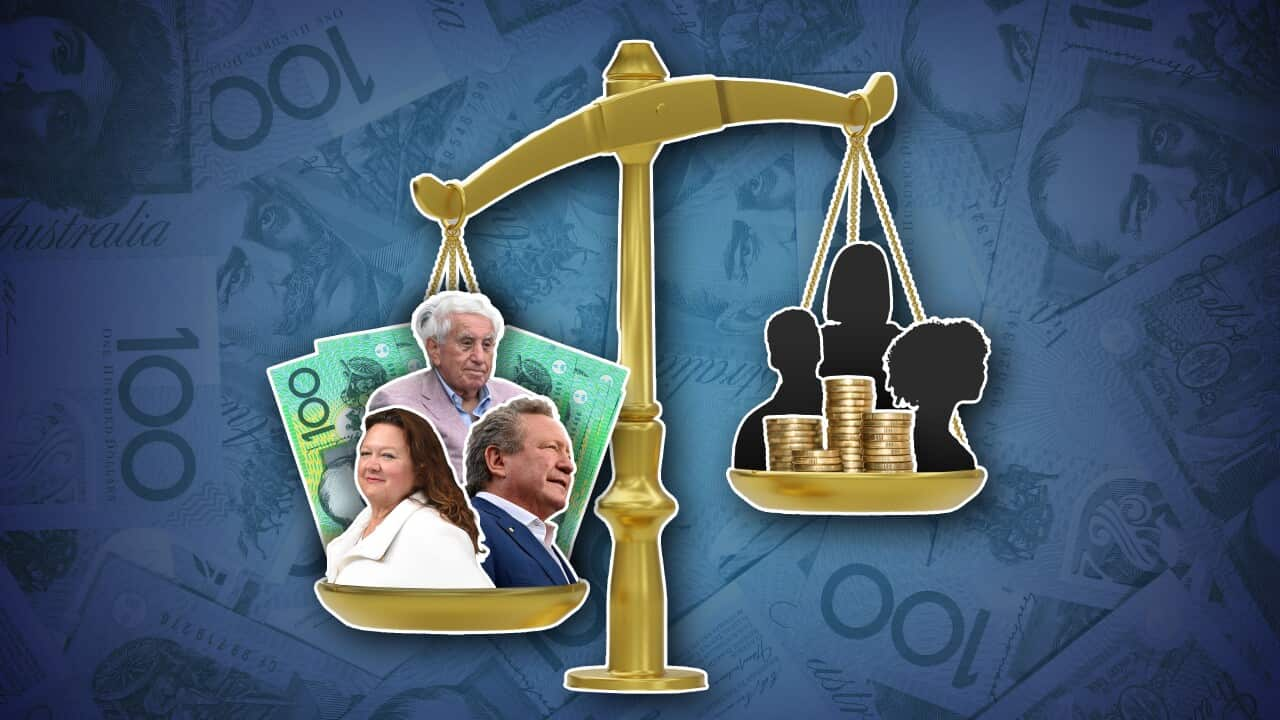Key Points
- A new report has found the richest Australians have doubled their wealth since 2020.
- The report examined inequality, wealth, and corporate power around the world.
- Report author Oxfam is calling on the government to address wealth inequality and scrap stage three tax cuts.
The wealth of the three richest Australians - mining magnate Gina Rinehart, cattle and mining businessman Andrew Forrest and real estate developer Harry Triguboff - has more than doubled since 2020, according to new analysis from Oxfam.
According to the charity, the richest Australians made an average of $1.5 million per hour, with the total wealth of the country's billionaires increasing by over 70 per cent, or $120 billion.
Around the world, billionaires are almost $5 trillion wealthier than in 2020, while five billion people worldwide have been made "life-threateningly poorer", Oxfam said.
The median hourly earnings for Australian employees is $39.50 per hour, up $2.50 since August 2022, according to the Australian Bureau of Statistics.
Now, the charity is calling on the Australian government to address growing wealth inequality - starting with .
The tax cuts, which are scheduled to come into effect from 1 July, will lower marginal tax rates.
Workers with a taxable income above $45,000 will benefit, but high-income earners are set to receive the highest gains.
The cuts are projected to deliver an annual $9,000 tax reduction to those earning $200,000 and above, while those earning $50,000 will see their tax reduced by $125.
Oxfam Australia chief executive Lyn Morgain said governments have a responsibility to improve wealth distribution.
“We cannot accept a society that promotes the gross accumulation of wealth alongside widespread global poverty," she said.
"One of the best mechanisms we have to address this is taxation.
"The shame of our woeful global response to catastrophic disasters, displacement, famine and the climate crisis cannot be attributed to a scarcity of resources, it is distribution - and that’s the problem all governments, including the Australian government, need to tackle urgently," Morgain said.
Prime Minister Anthony Albanese said while the government is "committed" to managing inequality, the tax cuts will still go ahead.
"The government's position hasn't changed ... inequality is an issue and the government has looked at ways in which we can improve that position," he told ABC radio.
Albanese said Labor will continue to look at measures to help those doing it tough, in the .
Most billionaires are men: Oxfam
Oxfam's report also found the wealth of the world's five richest billionaires had more than doubled since the start of this decade, while 60 per cent of humanity had grown poorer.
This wealth is concentrated in the Global North, with countries there home to 21 per cent of humanity, but 69 per cent of private wealth.
Men make up the majority of billionaires, and globally men own US$105 trillion ($157 trillion) more wealth than women.
The world's five richest men have more than doubled their fortunes from $610 billion to $1.3 trillion since 2020 at a rate of $21 million per hour, according to the report.

The Global North is home to 69 per cent of the world's private wealth, according to Oxfam. Source: SBS News
148 top corporations made on average $18.24 billion in annual profits, 52 per cent up on the three-year average, while hundreds of millions faced cuts in real-term pay.
These corporations are worth $15.35 trillion, equivalent to more than the combined GDPs of all countries in Africa and Latin America.











